White lions really exist
White lions were considered to have been godlike by African peoples, and freaks of nature that shouldn’t live in the wild by people of the West. However, their uniqueness is obvious, regardless of people’s beliefs.
Are white lions actually the cripples of nature whose place is in captivity? Or maybe their white fur really is a sign of gods? No matter how we look at it, it is certainly worth getting some information about blonde lions 🙂
White lions are worth putting next to white tigers and black panthers, that were described earlier.
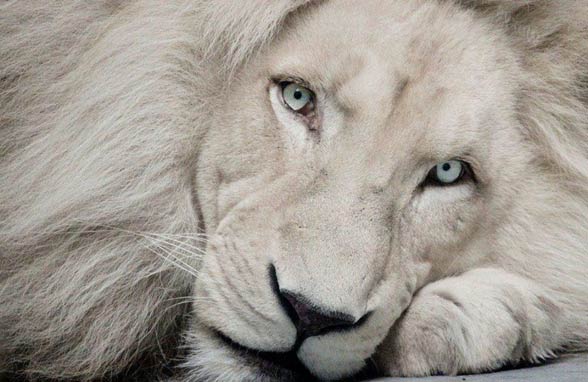
White lions in the wild
White lions aren’t treated as a separate subspecies. However, it is believed that, along with other South African lions, they are a variety of the lion living in South Africa, mainly in the region of Timbavati, where, according to local inhabitants, they have been occurring for ages.
White lions also occur in a number of nature reserves, mostly in the Republic of South Africa. The first documented observation of such an individual comes from 1938, but white lions drew public attention for the first time in 1970s, after the publication of a book by Chris McBride, titled “The White Lions of Timbavati”.
Until 2009, when white lions were introduced in the wild again, it was believed that there was no chance they could survive in the wild. Probably because of this belief, the majority of white lions were caged in zoos.
To this day, many critics think that white lions shouldn’t be introduced to the natural ecosystem, because they will practice inbreeding to which they got used to in captivity.
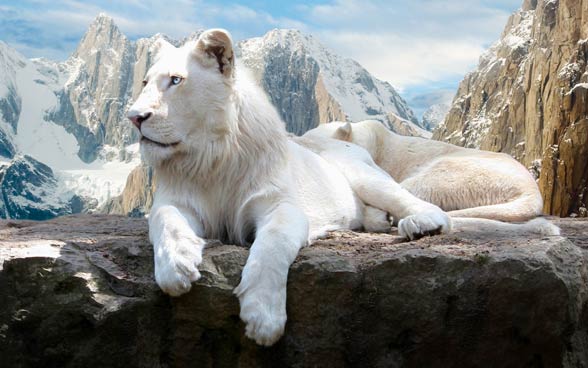
Are white lions albinos?
White fur color of white lions is not a sign of albinism (the lack of pigment in hair, skin and irises), but leucism (the deficiency in darker pigments in skin and hair, but not in irises). The reason for this disorder is a mutation of the gene also responsible for albinism, but in case of leucism, it is a milder form of this mutation.
Therefore, not all lions are snow-white. Many of them have blonde, creamy, and almost purely white skin and fur. Because this mutation doesn’t cause the lack of pigment in irises, white lions often have amber, hazel, golden, but also blue-gray, green, and gray eyes (because of selective breeding you can also see blue-eyed white lions). The pads of the paws and mouth are also pigmented, which is impossible in albinos.
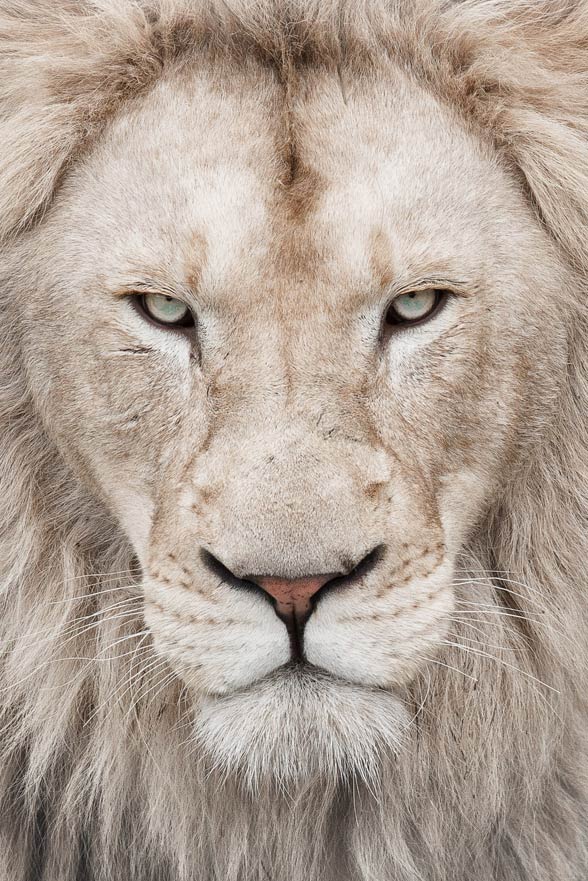
Reproduction
Because white lions are treated as a tourist attraction in many places around the world, they are often selectively bred in zoos and nature reserves.
To plan the birth of a white lion you need to start inbreeding, which is mating of closely related individuals. Inbreeding depression, which is the decrease of vitality of the individuals born by inbreeding, is the result of such actions. It is reflected in various genetic and physical defects, and decreased fertility.
Zoo employees are not very happy when a white lion is bred to an ordinary one, because then the alleles responsible for unique fur coloration disappear. However, these concerns are invalid, because the gene that triggers white fur and skin color is recessive. Therefore, a cub with one white and one ordinary parent still carries the white gene, so in the future it can have white offspring, unless it is not bred to a white lion.
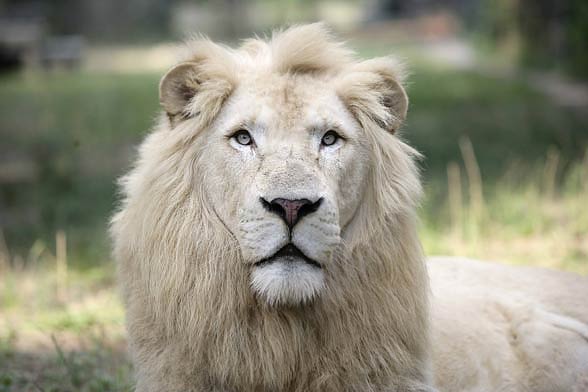
White lions in captivity
- Kruger National Park and Hluhluwe-Umfolozi Game Reserve, the Republic of South Africa – 3 litters in 1979 in Kruger National Park, 1 white lion in Hluhluwe-Umfolozi Game Reserve.
- West Midland Safari Park, England – in 2004, 4 white individuals (1 male and 3 females) were brought to West Midland Safari Park in England. They have been at the same time the only white lions in Great Britain. In 2008, one of the females gave birth to 4 white cubs. At the end of 2012, it was announced that the quadruplets were sold to a Japanese circus, although they were sent to a businessman, Jim Clubb, the owner of a zoo in Chipping Norton in Oxfordshire.
- Lory Park Zoo, South Africa – nowadays, there are 2 adult white lions named Daniel and Heidi. They are the parents of 8 cubs: the first 3 were born in 2012, the next 5 a year later.
- Jurques Zoo, France – in May, 2007, there were 4 white cubs born, that had to be fed by humans, because their mother didn’t take care of them properly.
- Belgrade Zoo, Serbia – in this zoo, there are as many as 12 white lions.
- Tbilisi Zoo, Georgia – in December, 2013, 4 white lions were born, and the next 3 were born in May, 2014.
- Pafos Zoo, Cyprus – in 2011, the zoo was donated 2 seven-month-old white lions.
- A zoo in Hungary – the owners of a private zoo purchased 2 young white lions: male and female.
- Toronto Zoo, Canada – in 2012, 3 white lions were brought to the Canadian zoo.
- Singapore Night Safari – the owners of this facility have recently purchased a white female and a white male.
- Kingdom of Zion, New Zealand – a lion protection and preservation sanctuary has purchased 6 male and 4 female white lions.
- In Europe, the white lions can also be found in Polish zoos.
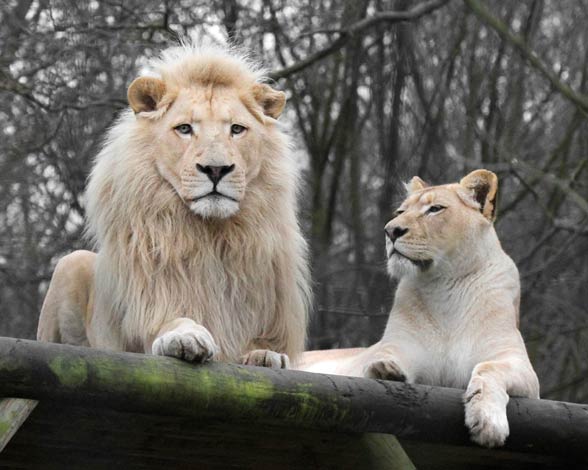
Are there black lions?
Although, as you can see, there are white lions, a black lions do not exist. We have discussed this issue thoroughly in the article: Black panther. We presented there also a photomontage made using Photoshop.
White lions – interesting facts
- The indigenous peoples of Africa treat white lions as sacred animals.
- Contrary to the public opinion, the white coloration of lions doesn’t affect their life in natural environment negatively. According to Global White Lion Protection Trust, white individuals re-introduced to natural ecosystems are able to hunt and reproduce without human intervention.
- The Latin name Panthera leo krugeri doesn’t refer only to white lions. It is also used in relation to all South African lion subspecies, living mainly in Kruger National Park and neighboring reserves.

Discussion / Podcast on White lions
Let’s listen to a discussion about White lions
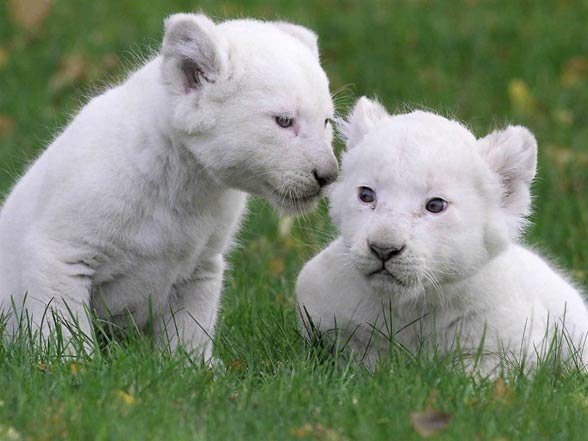

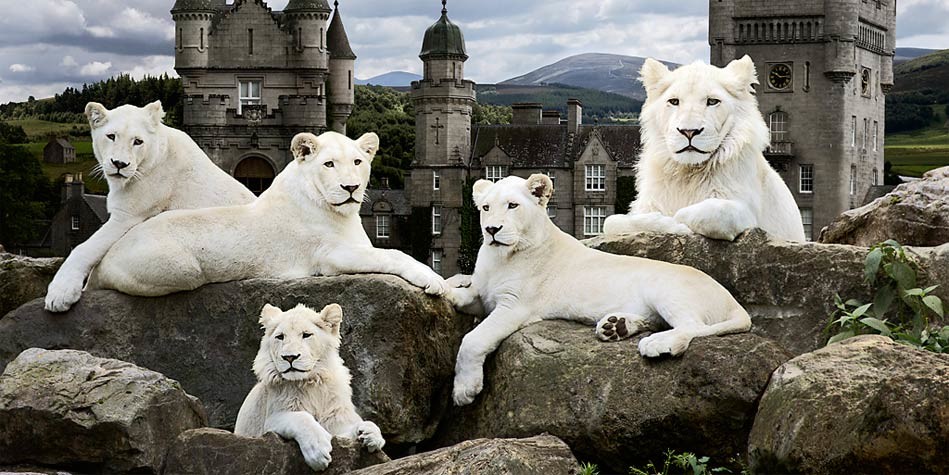

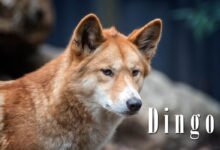



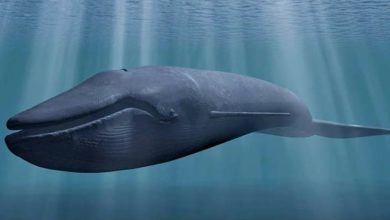
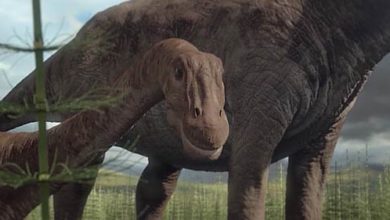

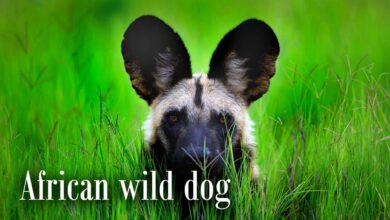


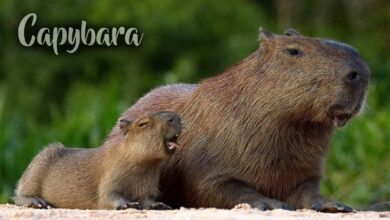
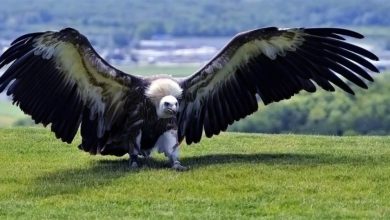
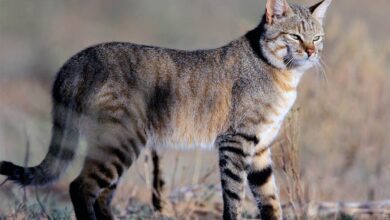

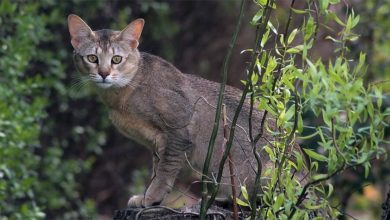

White lions, my love :)!
Beautiful cats. Amazing!